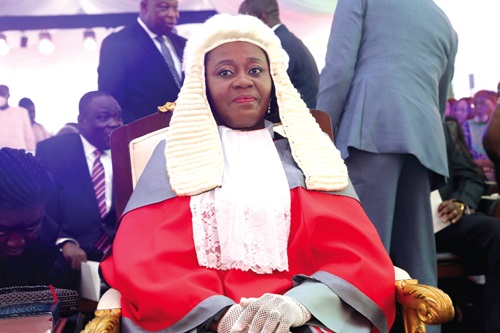
Legal challenge to LGBTQ+ Bill: Supreme Court demands fresh documents
The Supreme Court yesterday directed parties involved in the challenge of the constitutionality of the Human and Sexual Rights and Family Values Bill, commonly referred to as the anti-LGBTQ+ Bill, to re-file fresh documents.
The apex court consequently adjourned the cases indefinitely. The cases, which were called separately, were filed by broadcaster and lawyer, Richard Sky, and a human rights activist, Dr Amanda Odoi.
The business of the day was to deal with fundamental issues standing in the way of the substantive suits.
Motions
When Mr Sky’s case was called yesterday, his legal team, led by Paa Kwesi Abaidoo — who had originally filed an application for an interlocutory injunction to prevent the transmission of the anti-LGBTQ+ Bill to the President for consideration and subsequent assent pending the final determination of the substantive case — notified the court of two motions.
The first motion sought leave of the apex court to amend the reliefs sought in the interlocutory injunction, while the second sought leave to file supplementary affidavits in support of the injunction.
Objection
Counsel for the Speaker of Parliament, Thaddeus Sory, raised a preliminary legal objection to the first motion on grounds that his affidavit in opposition to the interlocutory application objected to the relief the plaintiff was seeking leave to amend.
He added that allowing the plaintiff to amend it would defeat his objection, which he had raised earlier in his affidavit in opposition to the interlocutory application. “He (Mr Sky) cannot avoid the consequences of that objection by filing a motion for leave to amend those reliefs and render my objection redundant,” he said.
The Attorney-General and Minister of Justice, Godfred Yeboah Dame, opposed the objection, stating that the rules of the court did not allow for such a process to be undertaken without the permission of the court.
Mr Dame further questioned the grounds for the objection as the new reliefs in his view were not any different in material fact except for a grammatical correction. “I do not see any error in procedure adopted by counsel for Mr Sky in seeking leave to amend a relief.
A close look at the relief shows no material difference from the reliefs originally sought,” he argued.
Court’s view
The court dismissed the preliminary objection, saying it was unnecessary and did not seek to help the court in any way. “Every party has an inherent right to present the appropriate formulation of their reliefs or other process before the court to enable the court to determine the real matters in controversy,” the Chief Justice, Justice Gertrude Sackey Torkornoo, who was the President of the panel, said.
Other members of the panel were Justices Mariama Owusu, Professor Henrietta Mensa-Bonsu, Ernest Gaewu and Yaw Darko Asare. They subsequently directed lawyers for Mr Sky to file a fresh motion paper for the interlocutory injunction with supporting affidavit and statement of case by May 17.
The panel also gave lawyers of the Speaker of Parliament and the Attorney-General up to seven days after May 17 to respond.
Language
Before the second case was called, the panel expressed worry over the choice of words used by both the plaintiff and lawyers for the Speaker of Parliament in the suits, describing them as inappropriate and scandalous.
Specifically, Justice Torkornoo cited the description of the private members in one of the plaintiff’s processes simply as “these persons”. “It is inappropriate to refer to the private members as ‘these persons’,” she said.
The Chief Justice also cited the use of “despicable” and “desecration” in processes filed by lawyers for the Speaker of Parliament when the second case was called. She, therefore, urged the parties to employ courteous language in their processes, give lawyers for the Speaker of Parliament the chance to change the wording of their legal documents and re-file their affidavit in opposition.
Background
In a writ invoking the jurisdiction of the apex court to interpret and enforce the Constitution, Mr Sky is seeking an order from the court to restrain the Speaker and Clerk of Parliament from presenting the anti-LGBTQ+ Bill to the President for his assent.
He is further seeking an injunction against any attempt to enforce the Bill, especially the aspect that criminalises same sex relationship. The writ filed at the Supreme Court on March 5, 2024, contends that the anti-LGBTQ+ Bill contravenes many provisions in the Constitution such as Article 12 (1) which enjoins
all arms of government to respect and uphold the fundamental human rights of all persons, Article 15(1) which protects the dignity of all persons, and Article 18(2) which protects the privacy of people.
Other provisions, he argues, are Article 17(1) which provides for equality before the law, and Article 21(a) and (b) which protect freedom of speech and thought. The plaintiff is, therefore, seeking a declaration from the Supreme Court that the Bill sins against all the above stated provisions, as well as Articles 106 and 108, which dictate the mode by which Parliament can pass a Bill.
Again, Mr Sky is seeking a declaration from the court that at the time the Bill was passed, Parliament lacked the requisite quorum as stipulated by Articles 102 and 104 of the Constitution.
Dr Odoi
Dr Odoi, on the other hand, is also at the Supreme Court with a case that the Speaker of Parliament and Parliament in general had violated the Constitution. It is her case that the Speaker of Parliament breached Article 108 of the 1992 Constitution by not giving an opinion on whether the Bill when implemented could lead to financial consequences on the country through a charge on the consolidated fund.
Writer’s E-mail:
